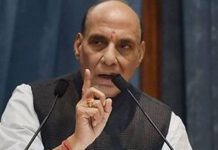Credible information post 26/11 is not enough if India doesn’t act on it
Harinder Baweja

PRIME MINISTER Manmohan Singh has informed us once again that “There is credible information of ongoing plans of terrorist groups in Pakistan to carry out fresh attacks.” Describing cross-border terrorism as “the most pervasive threat” facing India, the prime minister stressed the need for continuing vigilance. After the 26/11 attacks in Mumbai, the Prime Minister, should in fact, be asking senior ministers and bureaucrats in his own government this: what are you doing with this ‘credible information’? Even if Manmohan Singh’s statement was an attempt at putting pressure on Pakistan to accelerate its investigation against those involved for the Mumbai attack, he still needs to be asking his team for daily reports on what they are doing with the credible intelligence.
A rigorous analysis of advance information is the only effective way of thwarting attacks but a careful look at our past record only points to talk and little action. Let us just take a few heavy-duty statements that preceded the Mumbai attacks. Defence Minister AK Antony had himself informed the Lok Sabha that “Pakistan based terrorist groups, particularly the Lashkar-e-Toiba LeT have been exploring possibilities of induction of manpower and terrorist hardware through the sea route.” Then, former Home Minister Shivraj Patil too had categorically said, “Some Lashkar-e-Taiba (LeT) operatives are also being trained specifically for sabotage of oil installations. There are plans to occupy some uninhabited islands off the country’s coastline to use them as bases for launching operations on the Indian coast…”
Yet, the LeT succeeded in hitting Mumbai with both, impunity and ferocity. India quickly moved into ‘martyr and victim’ mode. But now, as the Prime Minister informs us of the possibility of another 26/11 attack, is it enough to just mount diplomatic pressure and not seriously attempt at refurbishing our own internal security apparatus? Should our politicians and security establishment not pay a price? Is it enough to only set up inquiry committees?
Several committees have submitted voluminous reports in the past. Back in 2001, after the sharp but short war in the mountainous heights of Kargil, the Girish Saxena Committee gave a report on the country’s intelligence apparatus. The report recommended an overhaul of technical, imaging, signal and, electronic counter-intelligence capabilities. The recommendations were accepted by a Group of Ministers (GoM) but in the seven years since they gave the report their stamp of approval, it has never been implemented beyond a few symbolic changes. More importantly, the Saxena Committee had called for a Multi-Agency Centre (MAC) to be set up under the Intelligence Bureau (IB). The MAC was to collect and coordinate terrorism-related information. It is functional, but under-staffed and underequipped. Prime Minister Manmohan Singh released funds for MAC only after the bomb attack in Delhi in September 2008, seven years after the Committee first recommended that it be set up.
Blame Pakistan and ISI for sure, but how about some accountability? Isn’t it time for heads to roll at home?
The most indicting finding of the still to be tabled Ram Pradhan Committee — set up to probe the 26/11 intelligence lapses — is that the Multi Agency Centre had not even marked its alerts to Mumbai’s Commissioner in charge of the state intelligence department. This officer, ostensibly supposed to be the fountainhead of all intelligence gathered by IB, RAW and other central agencies had, in fact, not even received a single one.
Blame Pakistan and its ISI for sure, but isn’t it time for heads to roll at home? Time too, Mr Prime Minister, to drop the martyr victim act. If there is credible evidence, assure us, that it is being acted upon.










